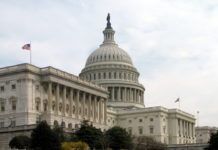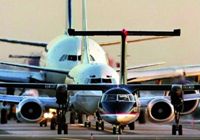The 2008 financial meltdown was a slow-motion train wreck compared to how rapidly the COVID-19 pandemic has cratered aviation, especially the airlines. Load factors have fallen off a cliff—as much as 50 percent—and revenues have taken a similarly steep dive.
The bottom has dropped out of airline stocks: American plunged from a recent high of $31.36 to $12.10; Delta $23.49 from $60; United $21.38 from $93.05. And Boeing? Boeing already needed a life ring and it got tossed an anvil instead. Just a year ago, Boeing was at $440.62. It closed Wednesday at $104.45.
The industry now wants help from the government to stanch the red ink. Airlines For America has approached the administration with a $54 billion request: $29 billion in grants and $25 billion in unsecured loans. Of the grants, $25 billion would go to passenger carriers, $4 billion to cargo airlines.
There is precedence for this, of course. I’ll ignore the bank bailout of 2008 and focus on a more apt example: the auto industry rescue of 2008/2009. How could you forget the roasting the CEOs of the Big Three automakers got for flying to Washington in their corporate jets to ask the government for rescue money? (Ford’s Alan Mulally made the trip, but only to say, “Actually, we’re good. Don’t need the money.”)
At the time, the bailout package—which eventually totaled $81 billion in loans and stock buys—was widely decried as corporate welfare. But it was not that. It was genuine socialism because the government owned controlling shares in GM and Chrysler. Both companies had brought bankruptcy on themselves through sclerotic management that failed to rapidly transition to smaller and more fuel-efficient vehicles as fuel prices rose. GM and Chrysler had started the process, but Ford was ahead of them and had also negotiated its own credit line ahead of the crash. Ford wanted no government money, but access if it needed it. It didn’t.
As a condition of the bailout, the administration kicked out GM’s CEO, forced Chrysler to merge with Fiat to improve its short-term cash position and required both companies to accelerate development of fuel-efficient cars to be more competitive on the world market. The program ended in 2014, by which time it had cost taxpayers about $10 billion after the government-owned shares were sold off. You can decide for yourself whether that brief foray onto socialism was worth the investment. It did save the two companies and a quarter of a million jobs. I liked the results, but not the terms.
From some quarters, Airlines for America’s request will be seen as breathtaking hubris. I’m in that quarter myself. Bloomberg reports that over the past decade, the airlines have spent 96 percent of their free cash on stock buybacks. Some of that cash came from a corporate tax break. The average buyback budget for industry overall is about 50 percent. What do stock buybacks do? One thing they do is drive the stock price in favor of the “shareholder value” that propels contemporary American business. Buybacks soak up capital that would otherwise be used to develop new products and services, service debt, build cash reserves and, yes, pay employees. Perversely, some companies even borrow cheap money to buy their own stock. (Full disclosure: I have investments that may include airlines.)
And while we’re on the subject of cheap money, right now, it’s about as cheap as it can get. The Fed knocked the interest rate to zero and the discount rate is 0.25 percent. If I were king, I’d let the airlines exhaust the cash reserves they should have, seek commercial loans first, then maybe federal loan guarantees if they’re desperate. But grants? I’m not on board.
If an assistance package comes together, it should and probably will have some strings attached on employee and consumer protection.
“That includes requiring employers across aviation to maintain pay and benefits for every worker. No taxpayer money for CEO bonuses, stock buybacks or dividends. No breaking contracts through bankruptcy,” said Sara Nelson, president of the Association of Flight Attendants.
Just to throw in some sparks from my personal axe grinding, I’d insert this: You can charge whatever fares you want, but those change fees have to go. It wouldn’t be inappropriate to require the companies, at least for the period of the loans, to require a pandemic planning program with reserves. Sort of like the bank requiring insurance as a condition of your mortgage. And people who say this was unforeseen have a point, but also a narrow view. Serious pandemics are a realistic risk of having 8 billion people on our little blue orb. The dry run for COVID-19 was the SARS epidemic of 2002 and later the H1N1 outbreak of 2009/1010. We promptly forgot the lesson. Business planners who are surprised need to expand their reading list.
While I’m sympathetic to the view that, as a matter of principle, publicly owned businesses don’t deserve bailouts, the airlines are the core of an aviation economy that’s 5 percent of GDP at more than $1.6 trillion, according to the FAA. It employs about 11 million people. (That’s 2016 data.) GA, right down to your local FBO, is part of that economy.
It makes no sense to flush that down the drain just on principle because reconstituting it from the ashes of bankruptcy would just extend whatever recession is coming and bring on a liquidity crisis we now don’t have. So I’m holding my nose while the treasury writes the check.
Judging the Risk
As pilots, we all make risk decisions based on known data. That means checking the weather, doing the fuel calcs, weight and balance, performance and so forth. We’re comfortable with that. Trying to apply that methodology to the COVID-19 personal and collective risk falls apart because the data is so vague. Testing for the virus in the U.S. is still far behind albeit catching up, so that people who say the whole thing is overblown can be just as right as those who say the pandemic is out of control. But the math favors the latter.

So, let’s fall back on some theory. A supremely talented YouTuber named Grant Sanderson recently published this brilliant video about how an epidemic undergoes exponential growth, why it eventually abates and how to predict and know when that happens. These assessments are only as good as the data fed into them, so take that for what it’s worth. But it’s helpful to understand the potential and how individual and group actions can impact the arc of propagation. The curve is highly sensitive to individual factors driven by individual actions. The math is simple; you can do the calculations yourself. Then decide for yourself.
As we struggle through this most difficult of times, all of us have to make these risk decisions individually and collectively. I’ve got an airline trip coming up that’s certainly going to cancel and some local business travel that’s likely to go the same way. And please, please don’t do what a poster on my Facebook page did. He calculated his risk by dividing the number of U.S. deaths by the population and concluded his chance of dying was one in two million.
As I said in last week’s blog, the pandemic will get worse—for aviation and for everyone—before it gets better. But it will get better. Sanderson’s math shows how the curve peaks and then recedes. The math is inevitable.



































Think he might have a formula for the likelihood of my finding toilet paper? :-0
When U.S. corporations got a huge tax windfall from the Trump administration last year the idea was to reinvest it in their businesses. But, almost all of it went to stock buybacks, bonuses and stock incentives for top executives. Rainy day funds? What are those? And, that applies to most all companies, not just the airlines. Now they are all begging for bailouts.
Any student of business continuity planning should have recognized the potential for some serious impact based on historical events, even if they couldn’t fathom the extent of the outbreak. Unfortunately, in their haste, Congress will hand out gobs of money with few restrictions, so I don’t hold out much hope for the airlines to learn anything from this mess.
I agree.
My problem with this help is that the companies that own airlines seem to have a lot of cash reserves. It feels they are asking airlines and aviation group to ask for money so that they don’t touch their cash reserves. I hope that is being taken into account.
Even as your blog is being read Paul, one of the current bottle necks to the current bail out legislation proposal is a proposed prohibition against stock buy back. We’ll see how that turns out.
On another subject, much of our personal household food is farm to table, but on the way to and from the farm we see that the local supermarket parking lot is full, and now kids are accompanying parents in and out of the store. At this rate we risk supermarkets (toilet paper depots) morphing into Covid19 petri dishes.
…and that is precisely why I bought my hoard of toilet paper two weeks ago…
Paul,
You’ve put a great deal of thought and effort into this piece. I agree with you mostly. Particularly your review of the automotive industry bail out which worked out better than most expected. What concerns me is the view expressed in your statement “bankruptcy would just extend whatever recession is coming and bring on a liquidity crisis we now don’t have”. That was the argument for rescuing the financial sector during the mortgage crisis. It worked, but when the Fed tried to wind down its one trillion dollar balance sheet that proved politically impossible. During the COVID-19 epidemic the Fed has committed four times that with no end in sight. Eventually their balance sheet will need to be cleared. Either by raising taxes, hiking interest rates and strangling economic activity; or by monetizing it away at the printing press and triggering hyper-inflation.
So the choices are 1) do nothing and let them go bankrupt; 2) make trillions in liquidity available and hope it all works out. I don’t think anyone knows which road leads to the higher cliff.
I sure don’t. If I were the policy maker, it would be satisfying indeed to stick it to the airline CEOs by letting them founder. But that sticks it to all the employees, customers, vendors and the overall economy because airlines are significant cogs in the growth engine.
Having said as much, who knows? Let then fold, reorganize, slim down–especially American and Delta–and come back more competitive. (I’m channeling by college Econ 201 professor here…)
I don’t believe it would just be downsizing. That would be part of it, however, I do see the industry morphing into something that has yet to come into focus.
Best line I have seen to date re airline bailouts
Nothing changes, Capitalize the profits, Socialize the losses……
“ Nothing changes, Capitalize the profits, Socialize the losses……”
Moral hazard- The banks can make all the sub-prime loans they want. The airline industry can drive their companies into the ground. The automobile companies can pay their CEOs all the bonuses they want-
It’s a fact of life now-Burn down your company, and the taxpayer WILL bail you out. No need to save for a rainy day. No need to restructure or make improvements to your product. No need for sound business decisions. Pocket the money and leave the taxpayer holding the bag.
I just hope that all the restrictions that have been put in place go away when all this is over. Problem is when government takes power they don’t legally have in the name of “saving lives” government is not always willing to give it up. We are still dealing with unnecessary restrictions to GA operations that were put in after 9/11, and never eliminated. As far as the airlines are concerned I like Paul’s solution of making airlines burn up their cash first, then issuing loan guarantees. But no grants or taxpayer cash bailouts, and no chapter 11. If they can’t figure out how to stay in business then let them go chapter 7 and liquidate.
“I just hope that all the restrictions that have been put in place go away when all this is over.“
What Americans really need to be asking themselves: Think about all the restrictions put in place long before the outbreak. Do we really need those?
Due to the outbreak, TSA is now allowing more than 3.4oz of liquid per-person on aircraft. Ostensibly, to allow for more hand sanitizer. On a Wednesday: ”No, you can’t carry that much liquid on the plane; you may blow up the plane.” On Thursday, “brings as much of the “plane-blowing-up” liquid as you can get your hands on. Nothing more than proof of security theater.
On a Wednesday, a doctor only licensed in Kentucky, could not possibly treat patients in Maryland. Somehow, upon reaching the Maryland state line, that doctor is suddenly unable to recall his/her many years of training and experience. That doctor would simply start killing patients in Maryland.
Due to the outbreak, many States are now recognizing the licenses issued to doctors/nurses from other states to help with personnel shortages.
So on a Tuesday, That same Kentucky doctor can now drive to Maryland and is somehow capable of successfully, without killing them, treat Maryland patients.
How many rules/restrictions has this outbreak shown to be foolish and unnecessary?
I endured a four and a half year furlough during the early 80’s recession. The airline parked planes, furloughed employees and when business improved everyone was recalled. So what’s different now that taxpayers should be on the hook while the airlines could have been saving for that rainy day rather than doing a stock buy back and subsequent loss of all that value the past month? For my carrier, this is the seventh recession they’ve encountered since 1965 and it’s apparent the gold diggers at the top have learned nothing. Quite similar to the folks in government.
It’s not going to change until we let it change. At some point we have to learn to keep our hands off and let nature take its course.
Ambivalence under a microburst of uncertainty and the carpetbaggers.
I’m not sure bailouts are Socialism per se. It’s more like capitalism in that all money is not created equal. When you accept OPM (other people’s money), you must abide by their conditions. For example, a bank may loan money or set up a line of credit as long as your debt/equity ratio is below a certain amount. If it climbs above that amount, you pay back the line of credit. This may hamper your business decisions, but that’s what you signed up for when you accepted the money.
I think it’s perfectly reasonable for a bailout (and that’s what it is, nothing shameful about the word) to require that the receiver not engage in activities that negatively affect the people who are loaning the money, aka us. If the intent of a bailout is to provide a bridge to keep an economic infrastructure in place during an unprecedented event, so that system is still around once the all-clear is sounded, then it makes sense. Just don’t use that money to line your own pockets and make sure that all of the benefits stay within our borders.
Stock buybacks? Dividends?
Okay. What else becomes of retained earnings after taxes? Cash on hand? Or some form of (hopefully) growth-generating investments? Like… stock in OTHER companies? How has that worked out, in the last two weeks?
Stasis is a bitch. The extant alternatives likely are worse.
The virus is known to be biphasic (maybe even multiphasic). That’s… interesting – particularly from a vaccine perspective. Bottom line: when does this “end?” Stay tuned.
If I get a government check, I’ll use it to pay off the balance of my 2019 taxes. The irony is precious.
Yesterday, I heard a network news story about ISPs expecting to have to throttle bandwidth, due to vastly increased usage. Joy to the world.
My wife still works two days a week. Well, she DID – until the state shut down dental practices. Now she’s absorbed (being kind, here) with houshold projects. And noting that my hours spent at the CAD screen are… unproductive. No sh*t, Sherlock.
We have lifelong subscription seats to live stage theatre. All shows cancelled. But what about all of those always-nearly-starving theatre workers? And the 90% of the people I know – who suddenly are out of work? Rosie the Riveter didn’t have to stay 10 feet away from her coworkers.
“We’re all in this together” is becoming “we’re all in this separately.” Not exactly “every man for himself,” but you get the idea. Right?
In the months before my father died, he used to say “I’m sure glad that I’m on my way out, instead of on my way in.” For lots of reasons, he was right.
Just when I thought that retirement was boring…
Paul’s analyses and insights are a treasure. Plenty of food for thought. My brain won’t starve. Thank you.
The airlines need a healthy dose of Chapter 11. They can keep flying their new, vastly reduced schedule during the reorganization proceedings.
As a retired pilot from an airline that tanked, I have zero sympathy for this industry.
Chapter 7 is better. Airlines have already done chapter 11, some several times. Need to filter out the executives who have not figured out how to run a business.
James F.
The airlines could have used all those profits to reduce debt and build reserves but instead they spent 95% of it on share buy backs to pump the executives bonuses. They knew that if the poo hit the rotary occelator the government would bail them out just like they did for the banks and the auto makers in 2008.
So their epically poor business decisions will be covered with a contribution from everyone who pays tax’s. How is that not socialism ?
If I were god for a day I would make airline execs pay back every penny of their salaries for the last 5 years plus a life time ban on holding a C suite job so they have to acknowledge the consequences of their actions, the first prerequisite for receiving public funds.
Those stock losses are minor. You want to see losses, look at the independent oil companies like Apache, EOG, and Marathon Oil (not Marathon Petroleum who is a refiner) Their trade group put out a paper on why they do not think bail outs are a good idea. Oh, and these companies, unlike airlines, are more likely to disappear than reorganize. IMO, the airlines are being whiners. Suck it up, work the problem, and figure out how you will move forward. Every airline has issues that they know need fixing and have not dealt with. Time is available right now.
*** More importantly, if you know someone in the vacuum pump (or any other pump building business) could you contact them and ask them why they cannot make ventilators? Ventilators are like 100 year old tech. People should not die due to lack of ventilators.***
No bailouts without the stock being wiped out. Boeing spent about $4B buying back stock in 2019 and they just paid out about $1B in dividends two weeks ago. United was buying back large amounts of stock at $100+ last year.
Mark K: Don’t punish the Boeing stockholders (disclosure: that includes me). Punish the fired CEO who denied there was a problem and then failed to address it appropriately. He walked away with $39M. I’d like that kind of reward for a job poorly done. Maybe punish the board. But not the “little people” who foolishly thought they were investing in an icon of American technology and integrity. We have been punished already by the stock price dropping almost to what it was in 2008.
RE: the auto industry rescue of 2008/2009.
By the time I pay the dealer, and for the bailouts, I can’t afford to purchase an “American” automobile.
Just so happen, I was in the market for a new vehicle during the ‘08/‘09 downturn. Over the phone, I had negotiated a deal on a truck. Told the guy I’d be there that weekend to pick it up. That week, cash for clunkers came out. That Friday, I called the dealership to tell them I was on my way. “No deal”, says the dealer. “The sticker price for this truck is $35k, and that’s what we’re selling them for”.
Joe idiot, brining in his clunker, thought he was getting the deal of a lifetime on that truck. Meantime, a week before C4C, I had negotiated $24k out the door for the same truck.
I will never purchase another “American” vehicle again.
Two points to remember: the airlines, just like in 9/11, are weapons of mass destruction, having now propagated COVID-19 world-wide. Also, remember global warming? The solutions is carbon taxes, the ideal capitalist way to ration scarce resources. Doubling (or tripling) the price of airline tickets (and all fuels) will reduce the carbon footprint and provide government revenue to create a green economy that will thrive. The easiest way for the airlines to implement this is reduce their fleets by two thirds, rip out all the coach seats, and go back to a point-to-point schedule with reduced service with only business class. We need to introduce 6G and then 7G internet so we can replace physical travel with virtual travel. The main priority for airlines should be moving packages, not people.
Socialism is about the equitable allocation of shortages – rationing.
Capitalism is about the creation of abundance.
Taxes NEVER should be used to modify behavior. The only legitimate purpose for taxes is to raise needed revenues.
Is a bailout necessary or can the industry be mothballed and the employees paid out first from cash reserves and then from loans from Uncle Sam – perhaps underwritten by equity? When all this is over the aircraft, airports, and other infrastructure will still be there. The ramp-up after 9/11 shows that the demand will be there. The important thing is keeping the 11 million people who work in the industry from losing their livelihood in the meantime.
I’d love to say that there should have been some sort of Pandemic Prep Fund into which they paid (out of profits, not by adding more fees), but even that’s not particularly useful: what would the fund invest in that is pandemic-proof? Government bonds? And where does the money to pay back those bonds come from? Yeah, that’s right…
I agree wholeheartedly that the stock buybacks left them with less cash on hand than they otherwise would have, but it’s hard to imagine a scenario (other than this one) where it would be useful to stockpile 6 – 12 months operating expenses in cash. That money should have gone into pay increases, infrastructure, and dividends for shareholders.
Precisely the argument that the banking industry used when they attempted to derail the Dodd-Frank Bill. They failed, and Frank-Dodd now requires them to hold substantial CASH reserves and subjects them to periodic financial stress testing – so far none of them has asked for help.
Starry eyed new hire pilots at the airlines might not have read about their economic ups and downs. Retrenchment of that business can turn on a dime and has done so many times in my career.
During one of our growth spurts, probationary pilots sitting to my right had already purchased homes twice the cost of my modest dwelling based on there prediction of moving into a 777 seat within a couple of years. After my airline declared bankruptcy, quite a number of these folks checked out due to economic stress.
Living within your means and not upon market forecasts might have helped these individuals and applies equally to the companies we work for. My company declared bankruptcy, rescinded my retirement and then after all was said and done, continued business as usual with a recent price of just under $100/share. This was achieved with the advantage of corporate tax cuts and buy backs.
I suspect that if furloughed, military pilots will return to reserve or full time positions and others will backfill to their previous jobs. Been there done that.
Hans I like your reference to the “modest dwelling”. My kind of thing. Living life as though all of life is lived during the first and second segments after takeoff has proven to be a good thing. Even after a couple of proverbial engine failures life is good.
Paul: beautifully and thoughtfully written as usual. I agree with your no-stock-buyback requirement. In the press meeting this morning so did President Trump. As to Boeing being tossed an anvil by the virus (what an image!) they got themselves into this pickle. I would make it a requirement for disgraced Boeing CEO Dennis Muilenburg to give up his $39 million “severance” package and donate that among the families of the crash victims lives who were “severed”. And I say that as a Boeing stockholder. Once again it seems we cannot trust the fox to guard the henhouse. Shocking, isn’t it?
I have no debt and cash reserves to allow me to continue my current standard of living for 2 years. I was a gig worker long before that became fashionable and I was 38 years old before I got my first full time conventional job with all the usual benefits.
In retrospect making good money but not having job stability made me very
cautious about debt and the requirement to keep a cash reserve. I am in a fortunate position now but I feel for all the young pilots that thought the industry of the last few years was the new normal. They are getting a harsh lesson on how fickle the aviation industry is……..
It works the same in other businesses or fair weather endeavors. In good times it seems as if it will never end. So we spend as if the money source is endless. But the fan is always there.
On Boeing: I like what Bruce B. says.
Folks, before you go lock stepping in line agreeing with this clown and spewing the lefty puke about American business and airlines in particular, this is a total regurgitation of an article by NY times anti capitalist “journalist” Tim Wu, written about 3 days before this sap copy job. Typical knee jerk blame it on the airlines, corrupt execs stuffing their pockets with bonuses, airlines should have planned for this, etc, all nicely plagiarized here. Side note, I’m curious Paul, how much did AvWeb have stashed away in their Future Unknown Pandemic Set Aside Account? Do tell.
Ok Tim… whatever you say…
Tim:
I’m somewhere to the right of Attila the Hun, but I think that Paul’s piece is very interesting and thought-provoking.
If the only Letter Carrier that you’ve got is a drunken slob, you can condemn him to a life in the gutter. That may feel righteous, but there’s an unfortunate downside: you won’t be getting your customers’ checks via mail.
Right now, we’re trying to figure out how to put the planet’s population into economic suspended animation, while we wait for a medical solution. It could be a while. And for millions – perhaps billions – of people, re-awakening unharmed is not guaranteed.
How will Americans pay off the several tens of trillions of dollars of new debt that will result from all of this?
I know this much: in order to confront that question, first we’ll have to survive. Economically.
Decorum in these comments is the rule, not the exception. Whether you agree or not with Paul or any other blogger, name calling here reflects on the name caller, not the other way around and simply diminishes the name caller’s points of view.
I’m a bit disturbed about the demonization of stock buy backs. There will always be tools for bad leadership to use to make more money while providing less real value to a company and its customers.
What these crusades inevitably get us are so called fixes in legislation and tax law that further entrench those at the top (the powerful more than the rich) while creating hassles for honest folks.
The problem here is not really the buy backs which seem to me a tool that can have appropriate uses.
The leaders of all the airlines were all making what should have been predictably bad moves and being rewarded for it. Just like 2008 finance companies. Who here doesn’t think that the airlines will get smacked by world events on a regular basis of about once a decade? Yet all the high dollar people involved thought it was a bad idea to use resources to prepare? Why? How?
We are not experts, so we cannot likely figure out what’s going wrong, but it was so obviously wrong we all knew it. Yet nothing changed. What bothers me is how many of the folks in those rooms at the top will still get top jobs again. How does that happen?
Regarding whether Boeing should receive a bailout, watch this Bloomberg video report, especially after the 7-minute mark.
https://www.youtube.com/watch?v=EESYomdoeCs
With Boeing’s extensive record of stock buybacks and failed engineering, I do not think they should receive money without conditions.
Great video report Larry. Almost all the facts stated in this report are ones we have previously learned from many sources here and there, but this report pulls things all together, telling the story by connecting the dots in a most cohesive way. Thank you for the link.